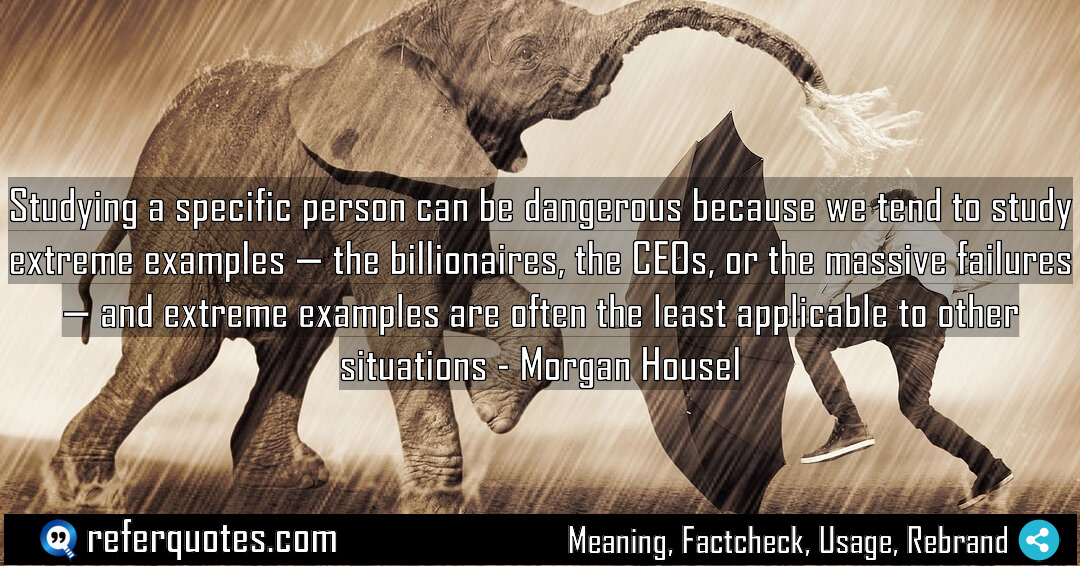
Studying a specific person is dangerous because we get hypnotized by the extremes. We chase the outlier success stories or obsess over catastrophic failures, forgetting these are the exceptions, not the rule. It’s a powerful reminder to look for patterns, not just personalities.
Share Image Quote:
Table of Contents
Meaning
This quote warns us that focusing on extreme outliers—whether massive successes or failures—gives us a distorted view of reality that is almost useless for our own lives.
Explanation
Let me break this down for you. We’re naturally drawn to the spectacular. The self-made billionaire. The CEO who turned a company around overnight. Or, on the flip side, the guy who lost everything on one bad bet. Our brains love these stories. They’re simple, they’re dramatic. But here’s the thing I’ve seen over and over: those stories are like lightning strikes. They’re fascinating to look at, but you’d be a fool to try and replicate the conditions that created them. The real, actionable wisdom—the stuff that actually builds lasting wealth or a good career—isn’t found in the extremes. It’s found in the boring, consistent, average behaviors of the millions of people who quietly succeed. It’s the power of compounding, not the power of a lottery ticket.
Quote Summary
Reading Level60
Aesthetic Score65
Origin & Factcheck
This insight comes straight from Morgan Housel’s fantastic book, “The Psychology of Money,” which was published in 2020. It’s a modern classic for a reason. You won’t find this quote misattributed to Warren Buffett or anyone else; this is pure Housel, distilling a complex behavioral truth into a single, powerful sentence.
Attribution Summary
Where is this quotation located?
| Quotation | Studying a specific person can be dangerous because we tend to study extreme examples — the billionaires, the CEOs, or the massive failures — and extreme examples are often the least applicable to other situations |
| Book Details | Publication Year: 2020; ISBN-10: 0857197681; ISBN-13: 978-0857197689; Pages: 256 (approx.) |
| Where is it? | Unknown chapter / page |
Context
In the book, Housel is building a core argument about how our personal experiences with money create a unique “financial psychology” that shapes our decisions. This quote sits right in the middle of that, pushing back against the idea that we can simply copy-paste someone else’s extreme journey onto our own completely different life.
Usage Examples
So, when do you use this? All the time.
- For a young entrepreneur: Instead of trying to be the next Steve Jobs—a true outlier—study the hundreds of small business owners in your city. How do they manage cash flow? How do they retain customers? Their “boring” success is far more applicable.
- For an investor: Don’t fixate on the one stock that went up 10,000%. That’s a lottery win. Focus on the diversified, long-term portfolio strategies that have worked for decades for the average person.
- For a team leader: Don’t model your culture entirely on a famously toxic but “successful” CEO. Look at the managers who consistently build loyal, high-performing teams without the drama. Their methods are the ones you can actually use.
To whom it appeals?
Share This Quote Image & Motivate
Motivation Score55
Popularity Score75
Shareability Score70
FAQ
Question: But shouldn’t we learn from the most successful people?
Answer: Absolutely, but with a crucial filter. Learn their principles—like hard work or integrity—not their specific, often luck-driven, extreme tactics. The *what* is often universal; the *how* is often a unique, non-repeatable event.
Question: What’s the alternative to studying extremes?
Answer: Study patterns and probabilities. Look at the common traits shared by thousands of successful people, not the one-in-a-million story. Look at the common causes of failure that happen every day, not the spectacular, freak-accident collapse.
Question: Does this mean extreme examples are useless?
Answer: Not useless, just dangerously seductive. They’re great for inspiration and for understanding the outer limits of possibility. But they are terrible, and I mean terrible, as instruction manuals for your own life.
Similar Quotes
You know, the most dangerous stories we make up are the ones that chip away at our self-worth. It’s not the external criticism that does the most damage, but the…
You know, the most dangerous lie is the one you tell yourself because it becomes your reality. It’s the story you weave so tightly that you can no longer see…
You know, the most dangerous thing a society can do is forget the importance of belonging. It sounds simple, but that’s the core of so many of our modern problems.…
Money without brains is always dangerous… and honestly, I’ve seen this play out so many times. It’s not just about having cash; it’s about the wisdom to handle it. Without…
You know, I’ve always found that “Those who never take risks are condemned” to a life that’s… safe, but ultimately unremarkable. It’s a powerful reminder that playing it too safe…
